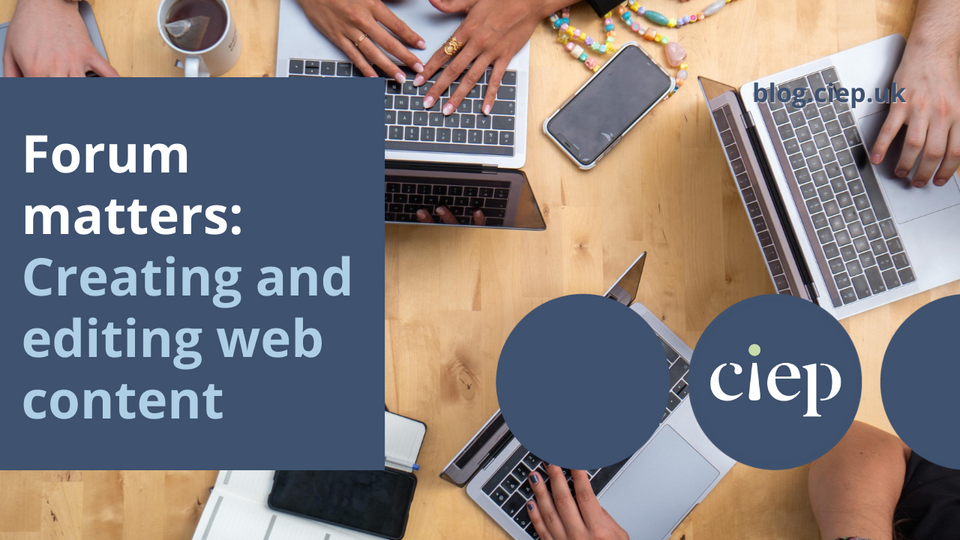This feature comes from the band of CIEP members who serve as forum moderators. You will only be able to access links to the posts if you’re a forum user and logged in. Find out how to register.
Posts on this topic that are more than a year old might be of only historical interest, given how fast technology changes. The threads referred to in this article have been selected because they link pretty directly to work on websites, but don’t forget that issues of accessibility also apply to (or can be found in relation to) other media, such as PDFs.
Your own website
Although many editors and proofreaders rely on social media to network and expand their business, there is no doubt that having your own website helps establish your professionalism and is a good place for information about you that may get lost on Facebook and Instagram, or when LinkedIn and Twitter revamp their algorithms, or a newcomer takes people up another highway. One member’s request, Advice needed: moving from self-publishing to traditional fiction editing, ranged far and wide and pointed to just that conclusion.
Even if you’ve embraced the idea of developing a website it can be a slog, and a quick reach-out via the forums has kept members on track (‘How best to prioritise?’). After deciding to use a website design company, forum members have asked for recommendations, in threads entitled ‘website’ and ‘Web hosting and domain registrars’. Even that tricky sub-subject of emails has been covered in Email hosting recommendations.
Many CIEP members create and manage their own websites and have shared hard-earned advice on sites and specifics. You may already have chosen a provider, but if you are thinking of managing your own website then maybe you should have a look first at: Squarespace help; Creating a website then Websites again; Portfolio on WordPress website and New member & request for advice.
Members have asked each other for a quick review of their new or revamped websites (see Quid (I proofread your website) pro quo (you proofread mine) and quick website check) and for help on specifics such as T&Cs and Domain Name Extensions, or about the principles of Pricing and its absence on editor websites and the Use of first-person in freelance websites. The number of replies does vary, and sometimes the first one nails the answer, while at other times the discussion ranges so far you feel you’ve attended a mini-course in the subject – see Struggling to be competitive.
There are some topics that apply to more than websites but will certainly add a professional gloss, such as a source to spruce up the background of your profile pic in Useful website to create/edit profile pics or useful advice on accessibility in Text colours and backgrounds – best and worst for legibility? and Q about hyperlinks in Forum signature.
Working on other websites
You don’t have to have created a website to be able to work on one (although it does help), but it is worth doing some training on the subject. CIEP offers two specific courses: Editing Digital Content and Web editing. But the forums are also up there when it comes to learning. We’ve all had an itch when we’ve spotted some bad practice and asked ourselves, should I say something? Read the thread and then decide.
You’d think a business would see editing their website as a no-brainer, but sometimes getting at the content can be tricky. Copyediting of websites and general advice on editing a website offer some useful insights and links.
SEO and accessibility are two aspects that you really need to get to grips with if you are going to offer a good service to website clients, and the forums are full of good advice on: best font/typeface for emails; quote marks and other punctuation for easy reading and accessibility; Rewording a bullet list for a website; Should numbers be spelled out in Websites?; Providing hyperlinks: best practice?
Good luck with your own and other websites. And don’t hold back on developing your skills and sharing your experiences through the CIEP forums.
 About the CIEP
About the CIEP
The Chartered Institute of Editing and Proofreading (CIEP) is a non-profit body promoting excellence in English language editing. We set and demonstrate editorial standards, and we are a community, training hub and support network for editorial professionals – the people who work to make text accurate, clear and fit for purpose.
Find out more about:
Photo credit: laptops by Louise Viallesoubranne, notebook and laptop by Marissa Grootes, both on Unsplash.
Posted by Harriet Power, CIEP information commissioning editor.
The views expressed here do not necessarily reflect those of the CIEP.


